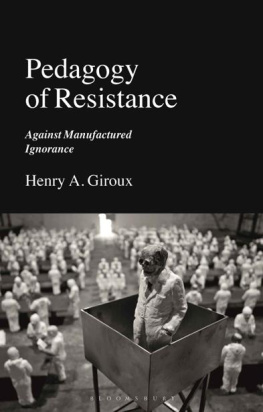Henry A. Giroux - Neoliberalisms War on Higher Education
Here you can read online Henry A. Giroux - Neoliberalisms War on Higher Education full text of the book (entire story) in english for free. Download pdf and epub, get meaning, cover and reviews about this ebook. publisher: Haymarket Books, genre: Politics. Description of the work, (preface) as well as reviews are available. Best literature library LitArk.com created for fans of good reading and offers a wide selection of genres:
Romance novel
Science fiction
Adventure
Detective
Science
History
Home and family
Prose
Art
Politics
Computer
Non-fiction
Religion
Business
Children
Humor
Choose a favorite category and find really read worthwhile books. Enjoy immersion in the world of imagination, feel the emotions of the characters or learn something new for yourself, make an fascinating discovery.
- Book:Neoliberalisms War on Higher Education
- Author:
- Publisher:Haymarket Books
- Genre:
- Rating:4 / 5
- Favourites:Add to favourites
- Your mark:
- 80
- 1
- 2
- 3
- 4
- 5
Neoliberalisms War on Higher Education: summary, description and annotation
We offer to read an annotation, description, summary or preface (depends on what the author of the book "Neoliberalisms War on Higher Education" wrote himself). If you haven't found the necessary information about the book — write in the comments, we will try to find it.
Neoliberalisms War on Higher Education — read online for free the complete book (whole text) full work
Below is the text of the book, divided by pages. System saving the place of the last page read, allows you to conveniently read the book "Neoliberalisms War on Higher Education" online for free, without having to search again every time where you left off. Put a bookmark, and you can go to the page where you finished reading at any time.
Font size:
Interval:
Bookmark:
NEOLIBERALISMS WAR
ON HIGHER EDUCATION
NEOLIBERALISMS WAR
ON HIGHER EDUCATION
SECOND EDITION
Henry A. Giroux

2014 Henry A. Giroux
This updated paperback edition
published in 2020 by
Haymarket Books
PO Box 180165
Chicago, IL 60618
773-583-7884
www.haymarketbooks.org
ISBN: 978-1-64259-092-0
Distributed to the trade in the US through Consortium Book Sales and Distribution (www.cbsd.com) and internationally through Ingram Publisher Services International (www.ingramcontent.com).
Cover design by Rachel Cohen. Cover images of protesters from University of California, Berkeley, in coalition with university employee unions, calling for a campus strike rallying against banks and budget cuts to higher education (AP Photo/Jeff Chiu), and of Earl Hall at Columbia University in New York, photographed in 2005.
This book was published with the generous support of Lannan Foundation and the Wallace Global Fund.
Library of Congress Cataloging-in-Publication data is available.
Printed in Canada.

For Rania
To those brave and committed teachers who are struggling to educate young people for a more just and democratic world
Acknowledgments
This book could not have been completed without the help of many people. My late dear friend Roger Simon provided a range of insightful ideas regarding the Quebec student protest. I will miss his friendship and the many conversations we had. Grace Pollock once again provided editorial advice and skills that continually improve the quality of my writing. Lynn Worsham has always been a wonderful colleague, and I want to thank her for publishing an earlier version of Intellectual Violence in the Age of Gated Intellectuals in JAC. I especially want to thank my administrative assistant, Maya Sabados, for reading and editing every word of this book. Her interventions were invaluable, and her insights, editorial help, and administrative skills have greatly improved the quality of the manuscript. Some of the ideas in this book have been published in a series of shorter articles in Truthout, CounterPunch, and Truthdig. Chapter six draws heavily on Neoliberalism and the Weaponizing of Language and Education, in Race & Class 16, no. 1 (2019): 2645.
INTRODUCTION
The Language of Neoliberal Education
MITJA SARDO INTERVIEWS HENRY A. GIROUX
MITJA SARDO: FOR SEVERAL DECADES NOW, NEOLIBERALISM HAS BEEN AT THE FOREFRONT OF DISCUSSIONS NOT ONLY IN THE ECONOMY AND FINANCE BUT HAS INFILTRATED OUR VOCABULARY IN A NUMBER OF AREAS AS DIVERSE AS GOVERNANCE STUDIES, CRIMINOLOGY, HEALTH CARE, JURISPRUDENCE, EDUCATION, ETC. WHAT HAS TRIGGERED THE USE AND APPLICATION OF THIS ECONOMISTIC LANGUAGE ASSOCIATED WITH THE PROMOTION OF EFFECTIVENESS AND EFFICIENCY?
Henry A. Giroux: Neoliberalism has become the dominant ideology of the times and has established itself as a central feature of politics. Not only does it define itself as a political and economic system whose aim is to consolidate power in the hands of a corporate and financial elite, it also wages a war over ideas. In this instance, it has defined itself as a form of common sense and functions as a mode of public pedagogy that produces a template for structuring not just markets but all of social life. In this sense, it has and continues to function not only through public and higher education to produce and distribute market-based values, identities, and modes of agency, but also in wider cultural apparatuses and platforms to privatize, deregulate, economize, and subject all of the commanding institutions and relations of everyday life to the dictates of privatization, efficiency, deregulation, and commodification.
Since the 1970s, as more and more of the commanding institutions of society come under the control of neoliberal ideology, its notions of common sensean unchecked individualism, harsh competition, an aggressive attack on the welfare state, the evisceration of public goods, and its attack on all models of sociality at odds with market valueshave become the reigning hegemony of capitalist societies. What many on the left have failed to realize is that neoliberalism is about more than economic structures, it is also a powerful pedagogical forceespecially in the era of social mediathat engages in full-spectrum dominance at every level of civil society. Its reach extends not only into education but also to an array of digital platforms as well as the broader sphere of popular culture. Under neoliberal modes of governance, regardless of the institution, every social relation is reduced to an act of commerce. Neoliberalisms promotion of effectiveness and efficiency gives credence to its willingness and success in making education central to politics. It also offers a warning to progressives, as Pierre Bourdieu insisted, that the left cannot afford to underestimate the struggles waged in the name of the symbolic and cultural and have not always been strategic in addressing this issue as a matter central to politics itself.
MS: ACCORDING TO THE ADVOCATES OF NEOLIBERALISM, EDUCATION REPRESENTS ONE OF THE MAIN INDICATORS OF FUTURE ECONOMIC GROWTH AND INDIVIDUAL WELL-BEING. HOWAND WHYDID EDUCATION BECOME ONE OF THE CENTRAL ELEMENTS OF THE NEOLIBERAL REVOLUTION?
HAG: Advocates of neoliberalism have always recognized that education is a site of contestation over which there are very high stakes regarding how young people are educated, who is to be educated, and what vision of the present and future should be most valued and privileged. Higher education in the sixties went through a revolutionary period in the United States and many other countries as students sought to both redefine education as a democratic public sphere and to open it up to a variety of groups that up to that point had been excluded. Conservatives were extremely frightened over this shift and did everything they could to counter it. Evidence of this is clear in the production of the Powell Memo published in 1971 and later in the Trilateral Commissions book-length report, The Crisis of Democracy, published in 1975. From the 1960s on the conservatives, especially the neoliberal right, has waged a war on education in order to rid it of its potential role as a democratic public sphere. At the same time, they sought aggressively to restructure its modes of governance, undercut the power of faculty, privilege knowledge that was instrumental to the market, define students mainly as clients and consumers, and reduce the function of higher education largely to training students for the global workforce. At the core of the neoliberal investment in education is a desire to undermine the universitys commitment to the truth, critical thinking, and its obligation to stand for justice and assume responsibility for safeguarding the interests of young people as they enter a world of marked massive inequalities, exclusion, and violence at home and abroad. Higher education may be one of the few institutions left in neoliberal societies that offers a protective space to question, challenge, and think against the grain. Neoliberalism considers such a space to be dangerous, and they have done everything possible to eliminate higher education as a space where students can realize themselves as critical citizens, faculty can participate in the governing structure, and education can define itself as a right rather than as a privilege.
MS: ALMOST BY DEFINITION, REFORMS AND OTHER INITIATIVES AIMED TO IMPROVE EDUCATIONAL PRACTICES HAVE BEEN ONE OF THE PIVOTAL MECHANISMS TO INFILTRATE THE NEOLIBERAL AGENDA OF EFFECTIVENESS AND EFFICIENCY. WHAT ASPECT OF NEOLIBERALISM AND ITS EDUCATIONAL AGENDA DO YOU FIND MOST PROBLEMATIC? WHY?
Next pageFont size:
Interval:
Bookmark:
Similar books «Neoliberalisms War on Higher Education»
Look at similar books to Neoliberalisms War on Higher Education. We have selected literature similar in name and meaning in the hope of providing readers with more options to find new, interesting, not yet read works.
Discussion, reviews of the book Neoliberalisms War on Higher Education and just readers' own opinions. Leave your comments, write what you think about the work, its meaning or the main characters. Specify what exactly you liked and what you didn't like, and why you think so.











